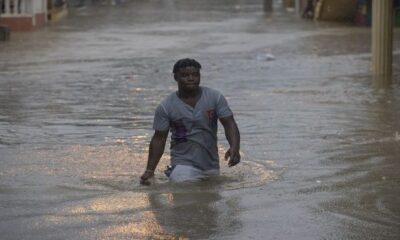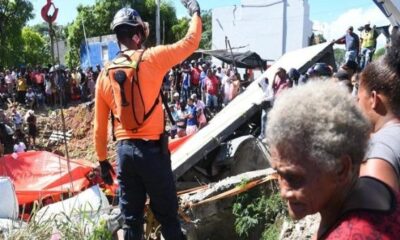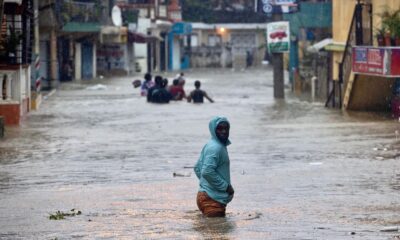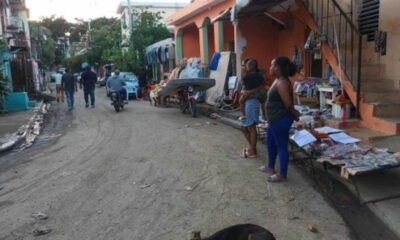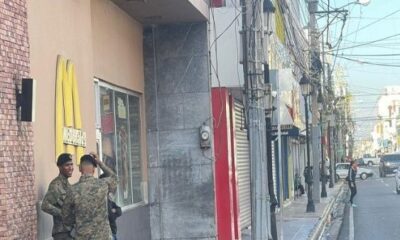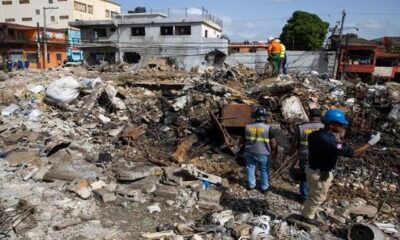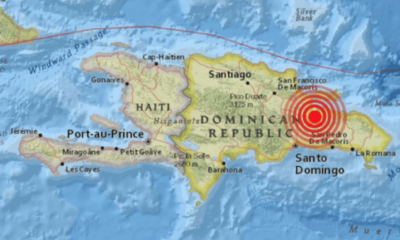International
The border market with the Dominican Republic, Haitians’ solution to stock up
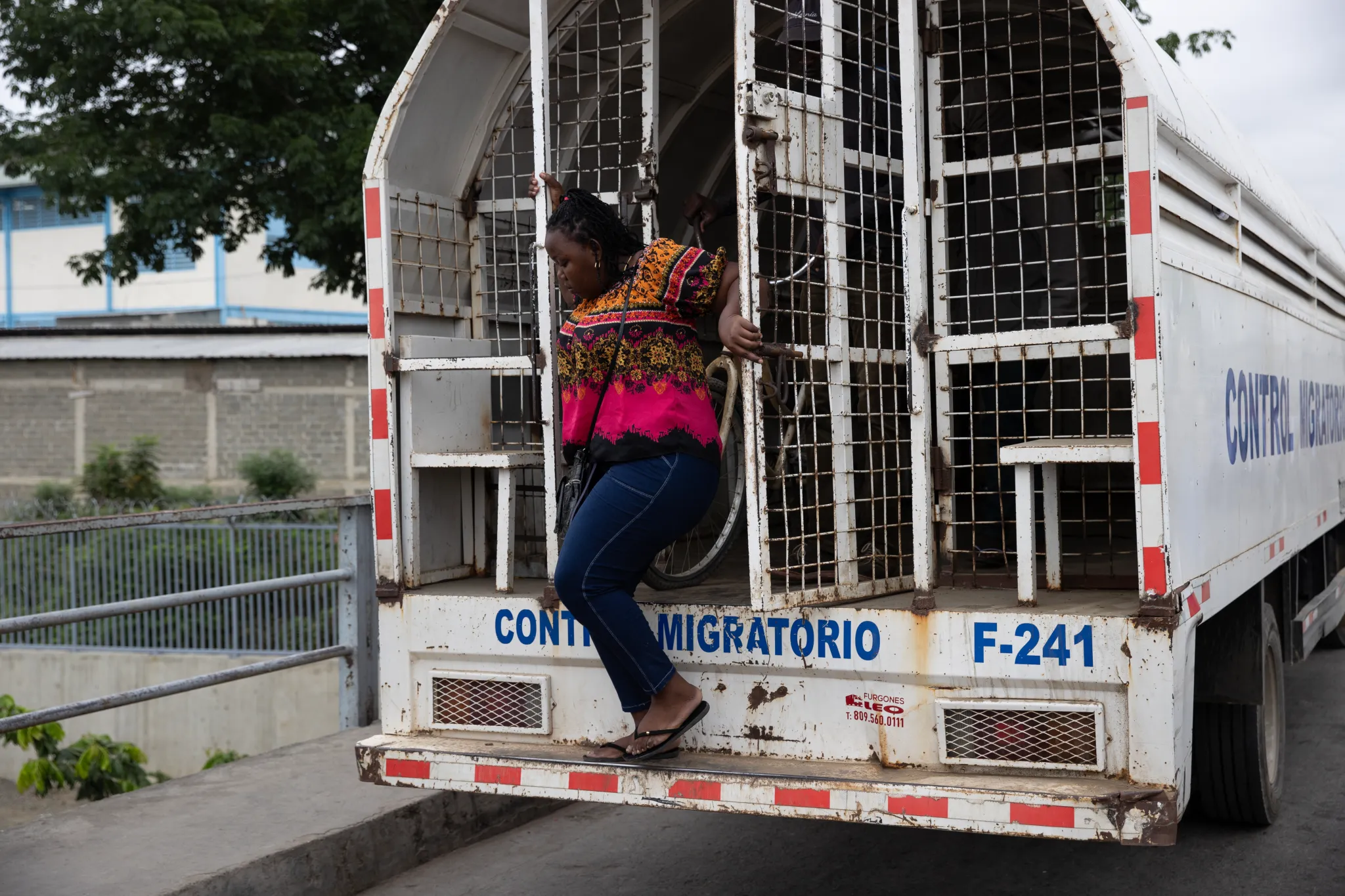
On Mondays and Fridays, when the binational market of Dajabón (northwest of the Dominican Republic) officially operates, thousands of Haitians crowd at the border to cross the neighboring country and stock up on items that are scarce in their territory and also to sell their products.
This Monday is no exception. At 8 o’clock in the morning and under the strong surveillance of the Specialized Border Security Corps (Cesfront) and the intelligence services, the Dominican Republic opens the border gate. On the other hand, thousands of Haitians, mainly women, have been waiting since the early hours of the morning for the binational market to begin.
A Cesfront official tells EFE that on Mondays and Fridays about 35,000 Haitians can cross the gate, many of whom come in search of food products such as bananas, eggs, salami, rice and flour, due to the deep crisis that their country is experiencing and insecurity.
According to the Food Organization of the United Nations (FAO), the lack of food leads to almost half of the Haitian population, that is, 4.97 million people out of a total of 11 million, facing acute food insecurity and, of these, 1.64 million are in phase 4 of emergency of the Integrated Classification of Food Security Phases (CIF).
But Haitians don’t just come to buy, others come to offer their products. This is the case of Archibald Wilfred, 45, a resident of the Haitian town of Ouanaminthe (just a few meters from the border) and who for six years has had a food products position in the binational market.
“Now I sell much more food than before because, unfortunately, there is not much food there. There is very little food and there is no money anymore,” he tells EFE Archibald, whose customers are mainly merchants from various cities in Haiti, even the capital, who later resell the merchandise.
When asked about his opinion about the deployment of a foreign mission in his country, Archibald considers that “the arrival of troops is 50 percent of the solution. If they arrive it will be good because people expect to have security and with them the gangs will end,” he confides.
Meanwhile, on the other side of the border, many Haitian policemen try to put order and separate into groups the thousands of people who are waiting to reach the border bridge in a relatively orderly manner, before entering the Dominican side.
Despite police efforts, on several occasions the situation becomes chaotic because many want to be the first to cross, which causes pushes, blows and falls.
In Dajabón, the Dominican authorities proceed to take the biometric data of the thousands of people who enter, as a way to control entry into the country.
Already inside the binational market, there are thousands of people who move in an unstoppable tingling, between shouting and pushing, buying and selling all kinds of products, mainly food, as can be seen in the long line of wheelbrows, ‘tricycles’ and packages on the heads of women returning to Haiti.
Through the border, not only do sellers and buyers enter and leave. Half an hour after the border gate is opened, the first truck of the Dominican Directorate General of Migration arrives that transports dozens of Haitians deported from the country.
María, a young woman of about 30 years old, gets off “the truck,” crying and trembling: “I have lived all my life in Dajabón, but my mother never did the papers for me,” she says.
“I went out to buy something and migration got me into the truck. I don’t know what I’m going to do now,” he adds, as he walks slowly towards Ouanaminthe.
And it’s not the only truck. Throughout the day, there are several who arrive with people who are expelled, a policy that continues despite the calls of the UN and human rights organizations to cease deportations from the Dominican Republic in the face of violence and the critical situation in Haiti.
International
Paraguay summons Brazilian ambassador over Itaipú espionage scandal

Paraguay summoned the Brazilian ambassador in Asunción on Tuesday to demand “explanations” and called its own representative in Brasília for consultations following Brazil’s acknowledgment of an espionage operation. The Brazilian government, led by President Luiz Inácio Lula da Silva, attributed the operation to the previous administration.
The surveillance effort aimed to uncover Paraguay’s position in now-suspended negotiations with Brazil regarding the pricing of electricity from the binational Itaipú hydroelectric plant, according to reports in the Brazilian press.
The Brazilian government “categorically denied any involvement in the intelligence operation,” stating in a Foreign Ministry communiqué on Monday that the espionage was carried out under former President Jair Bolsonaro’s administration (2019-2023).
“The operation was authorized by the previous government in June 2022 and was annulled by the interim director of the (state intelligence agency) ABIN on March 27, 2023, as soon as the current administration became aware of it,” Brazil’s government asserted.
Paraguay’s Foreign Minister Rubén Ramírez announced that Brazilian Ambassador José Antonio Marcondes de Carvalho was summoned “to provide detailed explanations” regarding the operation. Additionally, Paraguay recalled its diplomatic representative in Brasília “to report on aspects related to the intelligence activity conducted by Brazil regarding Paraguay’s government affairs.”
International
Elon Musk to step down as government advisor, per Trump insiders

President Donald Trump has informed his inner circle that Elon Musk will be stepping down from his role as a government advisor, according to a report by Politico today.
Citing three individuals close to Trump, Politico states that the president is pleased with Musk’s leadership at the Department of Government Efficiency (DOGE), where he has implemented significant budget cuts. However, both have agreed that it is time for Musk to return to his businesses and support Trump from a different position outside the government.
A senior administration official told Politico that Musk will likely maintain an informal advisory role and continue to be an occasional visitor to the White House. Another source warned that anyone thinking Musk will completely disappear from Trump’s circle is “deluding themselves.”
According to the sources, this transition is expected to coincide with the end of Musk’s tenure as a “special government employee,” a temporary status that exempts him from certain ethics and conflict-of-interest regulations. This 130-day period is set to expire in late May or early June.
International
Milei vows to make Argentina so strong that Falkland Islanders “choose” to join

Argentine President Javier Milei reaffirmed his country’s claim over the Falkland Islands (known as the Islas Malvinas in Argentina) and praised the role of the nation’s armed forces during a ceremony marking the “Veterans and Fallen Soldiers of the Malvinas War Day,” commemorating 43 years since the 1982 conflict with the United Kingdom.
Argentina continues to assert sovereignty over the islands, arguing that Britain unlawfully seized them in 1833.
“If sovereignty over the Malvinas is the issue, we have always made it clear that the most important vote is the one cast with one’s feet. We hope that one day, the Malvinas residents will choose to vote with their feet and join us,” Milei stated.
“That is why we aim to become a global power—so much so that they would prefer to be Argentine, making deterrence or persuasion unnecessary. This is why we have embarked on a path of liberation, working to make Argentina the freest country in the world and once again the nation with the highest GDP per capita on the planet,” he added.
-

 International5 days ago
International5 days agoSon of journalist José Rubén Zamora condemns father’s return to prison as “illegal”
-

 Central America3 days ago
Central America3 days agoU.S. Homeland Security Secretary urges Mexico to strengthen Guatemala border
-

 Central America4 days ago
Central America4 days agoPanama police clarifies that Interpol alert for Martinelli is still pending
-

 International5 days ago
International5 days agoMiyazaki’s style goes viral with AI but at what cost?
-

 International3 days ago
International3 days agoTrump urges Putin to reach peace deal
-

 International24 hours ago
International24 hours agoParaguay summons Brazilian ambassador over Itaipú espionage scandal
-

 Central America3 days ago
Central America3 days agoPanama grants Martinelli 72-hour extension to travel to Nicaragua
-

 International4 days ago
International4 days agoDeportation flight lands in Venezuela; government denies criminal gang links
-

 Sports24 hours ago
Sports24 hours agoFilipe Luis debuts as coach in Copa Libertadores with Flamengo
-

 Central America21 hours ago
Central America21 hours agoGuatemalan police officer killed in mob riots over baby kidnapping
-

 International24 hours ago
International24 hours agoElon Musk to step down as government advisor, per Trump insiders
-

 International24 hours ago
International24 hours agoICE agent’s arrest of suspect sparks controversy in Boston
-

 International24 hours ago
International24 hours agoMilei vows to make Argentina so strong that Falkland Islanders “choose” to join
-

 Sports24 hours ago
Sports24 hours agoVenezuela investigates 18 baseball players seeking asylum in Spain
-

 International24 hours ago
International24 hours agoÓscar Arias: Trump’s trade policies are a step backward
















